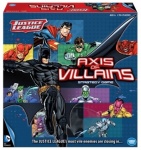 A DC licensee has apologized for its sexist approach to game design: Wonder Forge, makers of the Justice League Axis of Villains Strategy Game (see "Two 'Justice League' Games") admitted culpability in not including any playable female characters as members of the Justice League. Earlier this week, DC Comics apologized for sexist messages on licensed t-shirts (see "DC Apologizes for Sexist Superhero Shirts").
A DC licensee has apologized for its sexist approach to game design: Wonder Forge, makers of the Justice League Axis of Villains Strategy Game (see "Two 'Justice League' Games") admitted culpability in not including any playable female characters as members of the Justice League. Earlier this week, DC Comics apologized for sexist messages on licensed t-shirts (see "DC Apologizes for Sexist Superhero Shirts").The complaint was made by father and author Peter V. Brett in his blog. He purchased the game (which is a Target exclusive) to play with his superhero-loving daughter. Brett was upset that there were no female Justice League members (Wonder Woman, Zatanna, Hawkgirl, Vixen, Huntress) as playable characters, and spent time customizing the game to fix it. After feminist geek culture website The Mary Sue picked up the story, Wonder Forge issued an apology, and promised to do better in both future games, and in any reprints of Axis of Villains.
"First off, let me just say that we screwed up, and everyone here knows it," read part of the apology, issued by Kimberley Pierce, VP, Marketing Communications at Wonder Forge. "It’s an internal regret for our team that we did not include female super heroes in the game. And it’s a personal regret because so many of us are parents of daughters, who understand firsthand the importance of developing playthings that are inclusive and convey to girls a sense that they can do or be anything... It has inspired good internal dialogue on the subject and a renewed commitment to featuring female characters in our super hero games."
The fact that both DC and a licensee had to apologize for the same thing in a week, and a third comparable issue over kids pajamas sold at Target (shown in our article on the t-shirt controversy, linked above) came to light qualifies as a trend.
After current DC Entertainment CEO Diane Nelson and co-publishers Jim Lee and Dan DiDio took over back in 2010, one move they made was to eliminate the position of longtime DC licensing exec Cheryl Rubin and to rely more heavily on Warner Bros. Consumer Products to manage its licensing (see "DC Executive Shake-up Continues").
DC Co-Publisher Dan DiDio told ICv2 in a 2010 interview, "I think you're going to see more interaction between DC and Warner Bros. on the consumer product side mainly because they have an incredibly strong and powerful machine and it would be foolish not to take advantage of it" (see "Interview with DC’s Co-Publishers, Part 3").
In these cases, at least, the new way of handling licensing appears to have failed in stewardship of the brands at a time of a growing and increasingly vocal female audience for superheroes (see, for example, "'Spider-Woman' Manara Variant Spurs Controversy"). The lesson is that female fans are going to be looking not only at the comics and graphic novels, but also at all the expressions of the brands to find female-friendly characters and stories. Owners of IP libraries would do well to take note, and include licensing in how they plan to appeal to the fastest-growing segments of the market.


